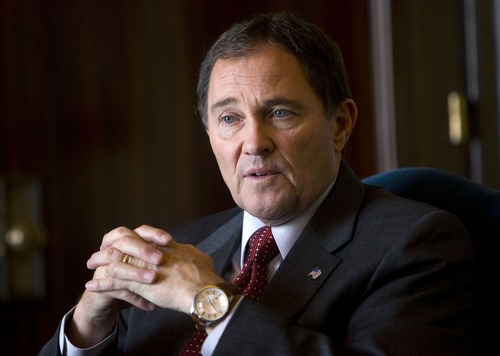This is an archived article that was published on sltrib.com in 2014, and information in the article may be outdated. It is provided only for personal research purposes and may not be reprinted.
Washington • Gov. Gary Herbert said the White House and outgoing Health and Human Services Secretary Kathleen Sebelius are inching closer to approving his alternative plan for expanding health-care for low-income Utahns through a block grant to the state, and the governor added that he's hopeful for a resolution this summer.
"The encouraging comment [Sebelius] made to me was, 'I see nothing here that would be a deal breaker,'" Herbert told The Salt Lake Tribune after leaving the White House on Tuesday.
Herbert is pitching the Obama administration on allowing a waiver under the Affordable Care Act through a plan Herbert calls Healthy Utah. His idea would be for the federal government to hand over the $258 million per year that would have gone to expanding Medicaid for low-income Utahns and let the state instead subsidize private insurance for those who qualify.
The governor's plan includes covering the estimated 111,000 Utahns who are at or below 138 percent of the poverty level. Subsidies for the recipients would vary depending on household income, ability to work, access to other insurance and health-care needs. The recipients would have to contribute about $420 a year on average toward their ultimate health-care costs.
Herbert met with Sebelius on Monday and with White House aides on Tuesday to help coax the decision in his favor. The governor said his plan was "received extremely well," and that the administration seems on board with the general concept and is now looking at the finer details.
"They reiterated to me that they've believed this shouldn't be a one-size-fits-all program, [a point that] we've always advocated," Herbert said. "It was encouraging to me for them to say that."
Some 25 states and the District of Columbia are expanding Medicaid as envisioned under the Affordable Care Act, though a few states like Utah have requested a waiver to take a different route.
Iowa and Arkansas are using federal Medicaid funds to offer insurance through a private marketplace option for residents while Michigan is covering low-income residents through Medicaid but with the ability to charge premiums, according to the Kaiser Family Foundation.
Pennsylvania has requested a waiver that mirrors Iowa and Arkansas but with changes to the eligibility of recipients. The hang-up for Utah could come in Herbert's efforts to include some sort of work requirement.
The Centers for Medicaid and Medicare Services declined to comment on Tuesday.
Herbert's plan would need buy in from state lawmakers, some of whom have opposed the idea of expanding Medicaid in any form because it could lock the state into the program after the federal guarantee of 100 percent funding dips to no lower than 90 percent.
Low-income advocates, meanwhile, fear Herbert's alternative plan could hurt those who can't afford to chip in to pay part of a premium.
Linda Hilton, director of the Coalition of Religious Communities, says even though the premium payments may be small, it can still be impossible for families who are struggling to pay for groceries.
"We're still looking for details because that's where the devil lives," Hilton said. "We're still concerned about low-income people paying anything for a Medicaid premium. ... Adding one more bill, even in the smallest amount, is a make or break [change] for a low-income person or family's budget."
Herbert said Tuesday he has not yet met with Obama's choice to succeed Sebelius, Sylvia Burwell, but will continue conversations with Health and Human Services in the meantime.



